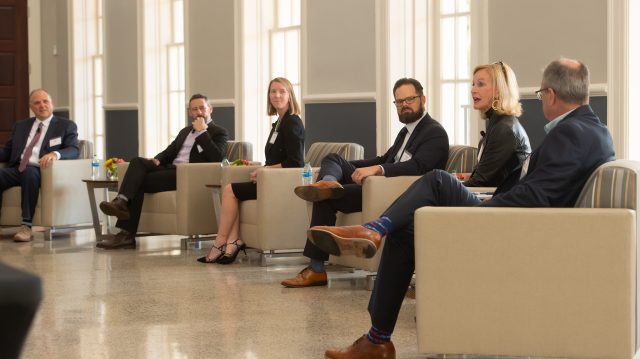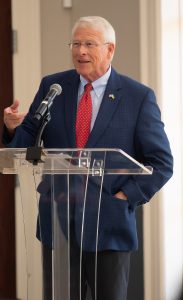
Panelists discuss economic opportunities and challenges for the state during the second annual Mississippi Competes Vision Session at the university. The session examined technology trends, business innovations and the state’s potential to take advantage of a high-tech economy. Photo by Kevin Bain/Ole Miss Digital Imaging Services
OXFORD, Miss. – Mississippi has the ingredients it needs to thrive in a high-tech economy, but the state’s leaders must embrace technology to ensure success, business and policy leaders agreed Tuesday (Nov. 8) at the University of Mississippi.
More than 60 leaders gathered at Ole Miss for the second annual Mississippi Competes Vision Session, a conference that aims to bolster the state’s economic competitiveness.
“The economy of yesterday is not the economy of tomorrow,” said Bill Cook, venture partner at Columbia Capital and president of Cook Consulting LLC. “This session is a forum that focus on embracing new and emerging technologies and learning how to create a vibrant ecosystem that can advance the state’s economy. ”
Cook pioneered the conference in 2021 as a way to showcase opportunities for advancement and to bring the heads of government, education and industry into one space.
Among the 10 panelists Tuesday were digital infrastructure industry executives, successful entrepreneurs, defense contractors and leaders in autonomous transportation. Guests also included U.S. Sen. Roger Wicker, Mississippi Secretary of State Michael Watson, state Rep. Clay Deweese and state Sen. Nicole Boyd.
The panels focused on how to create an ecosystem of accessibility and success for startup companies and entrepreneurs and the importance of autonomous transportation, both by land and by sea. Creating this ecosystem begins with policy surrounding the issues and continues with local and regional buy-in, panelists said.
The point of the session was not just to talk about opportunities, but to expose participants to new technology trends and innovative thoughts based on panelists’ experiences, and give attendees specific assignments to create opportunities for Mississippi, Cook said.
“We, Mississippi, can do better,” he said. “One economic development win does not solve our problem. We must compete as if we’re going to win them all.”

U.S. Sen. Roger Wicker talks to participants at the Mississippi Competes Vision Session about how the state can benefit from the push to compete globally in semiconductor chip manufacturing and research. Photo by Kevin Bain/Ole Miss Digital Imaging Services
“How do we compete? We create new ideas, advanced policy; we invest in people, infrastructure and tech. What happens if we compete? We learn, we grow, we prosper and we win.”
The university is working to help develop the workforce and technology needed to capitalize, UM Chancellor Glenn Boyce said.
“This is what a flagship university should do, and it’s what we’re doing today,” he said.
Panelists said the state is uniquely poised for opportunity, being between two major internet and autonomous vehicle hubs – Dallas and Atlanta – and having significant fiber optic communications infrastructure throughout the state. Panelist Sean Baillie, digital infrastructure executive, said that success in the world of data infrastructure requires four things: “land, power, water and fiber.”
Mississippi has those assets, panelists agreed. It just needs someone to act.
Throughout the panel, Cook often redirected focus to how the university can prepare students for entering the “economy of tomorrow” by providing hands-on training in robotics and by partnering with data center industries and cloud companies, both of which, speakers said, are experiencing exponential growth.
Boyce highlighted the university’s recent growth, including a 5.1% overall enrollment increase over 2021 and the university reaching an all-time high retention rate of 89.3%. Boyce lauded student achievements, such as the recent naming of two Truman Scholars, six Fulbright Scholars and three Goldwater Scholars.
“Why do I tell you all this?” he said. “Because we’re building a labor force and I want you to understand the quality of the labor force coming out of this university.”
Wicker, visiting on election day, touted the bipartisan passing of the CHIPS and Science Act in July, a bill that devotes $200 billion toward the production of semiconductor chips in the United States. America is lagging behind Asian countries in the manufacture of the chips, which are essential in the creation of vehicles, cellphones, medical equipment and many other computerized functions, he said.
This bill will be a starting point for the United States to excel in chip technology, and Mississippi won’t be left behind in that effort, Wicker said.
“We’re about to live the dream,” he said. “This is the moment, my fellow Mississippians, for us to be the leader in technology. You’re going to give us some ideas today. We mean to turn them into action.”